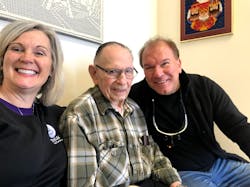The case that changed everyone for good
Near the end of the smash Broadway hit “Wicked,” Glinda, the good witch, and Elphaba, the wicked witch, perform the song, “For good.” The song describes how their unlikely meeting and being in each other’s lives caused the two of them to be changed. The lyrics go, “Who can say if I’ve been changed for the better. Because I knew you, I have been changed for good.” The lyrics rely on a play on words of the phrase "for good," which is used to mean both forever and for the better.
There are many people and circumstances that can change lives for good. When this happens, it is something to celebrate, embrace, and be thankful for. The profession of dentistry has the ability to change dental professionals, patients, and patients’ families in this fashion. Looking for the occasions when this happens brings extreme satisfaction to all involved.
One such case occurred, in an unlikely way, in a small town in the Midwest over a period of 20 months. Here is the story.
I am a dental hygienist, and I created a mobile hygiene practice, the HyLife Oral Health Alliance, as an extension of my oral care company. The mobile practice was designed to deliver dental hygiene services to elders residing in care communities. I was able to do this in the state of Wisconsin due to the passage of Wisconsin Act 20 legislation into law in June 2018. The law allows hygienists to practice in several settings without being tethered to a dentist in any way—no collaborative agreement, no exam prior to providing treatment, no nothing. One of these settings is skilled nursing facilities (SNF), which is the technical term for nursing care.
As I provided care to the elders in my hometown SNF, one man, Brink, presented with an extreme number of dental issues. Providing hygiene services for him was a challenge due to the poor condition of his gum tissues, heavy plaque and debris, as well as rampant tooth decay.
While none of this surprised me—I had seen similar cases all too frequently in this population—this particular case was different. Usually, when decay is suspected, the application of silver diamine fluoride (SDF) can work wonders to halt existing decay, while also helping to control the overall oral bacterial load.1
In Brink’s case, however, using SDF seemed akin to attempting to put out a full-blown house fire with a fire extinguisher. Something more was necessary. This patient needed a dentist, but from where? One would think the case could be handled by a dentist or dental organization visiting the SNF. But the reality is, cases like this are rarely handled on-site.
SNF regulations are put in place by the Centers for Medicare and Medicaid Services.2 Regulations require SNFs to have a dentist affiliated with the facility. Additionally, SNFs must assist residents in obtaining 24-hour emergency and routine dental care, making appointments, and arranging transportation services for these appointments. SNFs must provide, from outside sources, routine dental services such as annual inspection of the oral cavity, diagnosis of disease, dental radiographs as needed along with dental cleanings, fillings, and denture adjustments. Furthermore, the regulations require prompt referral (within three days) for lost or damaged dentures.
There are several challenges with these regulations: the regs are primarily disease-driven and based on emergency care, dentures, and whatever other procedures are covered under each state’s Medicaid plan. Most state plans typically do not cover many dental procedures for adults. Dentists affiliated with an SNF typically provide the “annual inspection” and ask if the resident is in pain. If no pain is reported, existing decay, broken teeth, etc., are often left untreated until the onset of pain. Notes are made that the inspection was completed and there were no issues. Bingo—the SNF is in compliance with dental services regulation 483.55.2
When the affiliated dentist or dental organization is notified of a resident experiencing discomfort, the usual treatment plan is to deal only with the tooth causing the pain. Rarely are all areas of decay treated, broken teeth removed, or dentition restored. This scenario is noted over and over again when individual states conduct oral health screenings of elders who reside in SNFs. These elders, like Brink, are falling through the huge gaps in federal regulations. As a result, according to the surgeon general, “Nursing home residents have extensive oral disease and poor oral hygiene and suffer the worst oral health of any population.”3 If the current system worked properly, this statistic would not exist, and state screenings would report health instead of disease.
While I am not required to work with a dentist, I anticipated that there would be times when my patients would benefit from a dentist’s opinion. To have the ability to connect with a dentist, I incorporated MouthWatch into my practice. MouthWatch is a computer software that enables me to share intraoral photos with dentists.
Brink had numerous appointments over the next several months with Dr. Reitz. Each time the patient arrived at the dental office, there was more decay and more broken teeth. Dr. Reitz could not keep up with the oral destruction. Feeling defeated, he called to let me know he felt he was fighting a losing battle and that it might be best to leave things as they were, removing teeth only if they became problematic for the patient. Having seen this scenario occur in my patients too many times, I didn’t want to travel down this road again if we didn’t have to. I asked Dr. Reitz what he thought about doing implant-retained dentures. After thinking about it for a few seconds, he replied, “Yes, but that would be really expensive.” My response was, “And…” Dr. Reitz said he wasn’t sure if Brink could afford the treatment, to which I replied, “Well, we are going to find out.”
The conversation with Brink’s niece went well. She said she would speak with her uncle and ask if he would be interested in having this type of dental work completed, and if he thought he could pay for it. To everyone’s surprise, the answer again was “yes!” The stars had aligned, bringing three people together—an elder in need who resided in a small-town nursing facility, a dental hygienist from that small town who was determined to assist in getting the patient’s needs met, and a dentist from the same small town who had the skills, passion, and team to take care of this elder.
We scheduled the appointments and arranged transportation with the SNF. Dr. Reitz and his dental team worked diligently with Brink to get him some teeth with which he could eat the foods he loved. The entire process took approximately four months, with a completion date of December 20. Brink was happy and joking with the dental team as he left their office.
Dr. Reitz noticed Brink’s speech had improved with the dentures. Prior to treatment, his speech was very difficult to understand. Everyone thought this was due to his dementia; no one had realized that maybe the patient’s speech problems were partially due to the condition of his teeth. Brink’s first stop with his new dentures was to the local diner for lunch, where he ate with teeth he could actually chew with!
There could be no better Christmas present for Brink and the rest of the people involved. We had worked together to get this dental treatment accomplished, serve this elder to the best of our ability, and do the right thing. On top of that, we had changed a life for good, and our lives were changed for good as a result. That is more than any of us could have asked for.
This case is an example of the power of passion, determination, and joining forces. This small Midwestern town is not the only place where things like this can happen. Changing lives for good through dental treatment of elders can be accomplished in any community. The details may differ in various areas, and there may be roadblocks. But, by thinking outside the box, developing alternative paths, and refusing to take “no” for an answer, everyone can be changed for good.
Read more:
Teledentistry: An exciting new tool in our arsenal
Striving for independence
State spotlight: New York
State spotlight: South Dakota
References
1. Silver diamine fluoride: How does it benefit your oral hygiene? Healthline website. https://www.healthline.com/health/silver-diamine-fluoride#benefits.
2. Pietraszewski D. Dental Services. Presented by Mobile Care Group/Oral Health Solutions NPO. LeadingAge Michigan. https://cdn.ymaws.com/www.leadingagemi.org/resource/resmgr/handouts/LTC_Reg_Nov_172016/483.55_Dental_Services_FINAL.pdf.
3. U.S. Department of Health and Human Services. Oral Health in America: A Report of the Surgeon General. Rockville, MD: U.S. Department of Health and Human Services, National Institute of Dental and Craniofacial Research, National Institutes of Health, 2000.
About the Author

Angie Stone, BS, RDH
Angie Stone, BS, RDH, began her career in the Navy as a dental assistant and then went on to complete her associate's in dental hygiene and bachelor of science in psychology. Her experiences are vast. She is an accomplished speaker, researcher, author, and founder of the HyLife Oral Health Alliance. Angie can be contacted at [email protected].
Updated July 8, 2021


